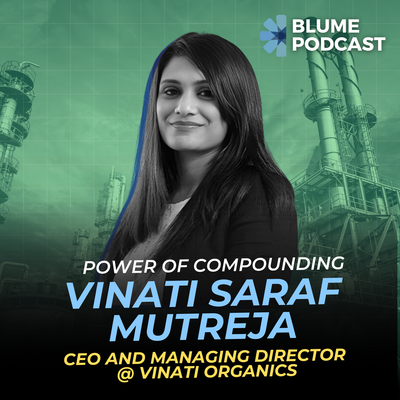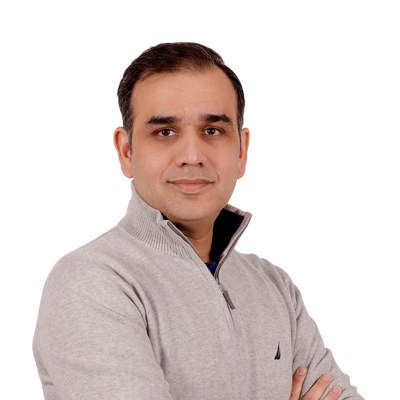If you think of a VC-investable business, the capital-intensive manufacturing industry, perhaps isn’t the first thing that pops into your mind.
Vinati Organics Limited’s numbers seem quite alluring, though.
Since the past 15 years, Vinati Organics has seen a ~1400X growth in its stock price while being debt-free for quite some time now.
Being at the company since 2006, Vinati Saraf Mutreja, its current CEO and Managing Director, has received various awards and recognitions, including being named Business Leader of the Year by the Economic Times and one of Asia's most powerful Business Women by Forbes.
She is also involved in philanthropy as a board director at Make-A-Wish India and is known for balancing personal development with her business leadership.
A woman leader in a predominantly male-dominated sector, Vinati's steadfast belief in the power of compounding is nothing short of remarkable.
Hers is a story that transcends stereotypes, showcasing that success knows no gender boundaries when tenacity, ingenuity, and resilience lead the way.
Our journey starts all the way in the year 1990.
The Early Years
Vinati's father, Vinod Saraf, started the Mumbai-headquartered company in 1990 and aptly named it after her six-year-old daughter.
She was exposed to the business from a young age and developed an interest in chemistry through her father's constant quizzing.
Vinati: “My father doesn't have a chemistry background. So he would, as when I was a teenager, he would talk to me about chemistry, trying to get answers out of my chemistry textbook. He was trying to understand. How does the mass balance work? And that's how my interest in chemistry developed.”
At an impressionable age, Vinati was as close to balancing chemical equations as she was to balance sheets.
Vinati: “By the time I was 17-18 I knew I wanted to do engineering in chemistry and also have a business background because I was interested in his business. So I went abroad, I did a dual bachelor's in business and engineering. And even then my father would visit me and take me to meet customers around the East Coast.”
After a brief stint in the US, Vinati came back to India and officially joined the business in 2006 when it was relatively small, with yearly revenues of Rs 60 crores.
The journey to Rs 2000 crores of revenue began with a few small steps.
Initial Challenges and Growth
As one of our previous guests, Manish Sabharwal, mentioned, India is not really a big market but a small market with huge potential.
In its initial days, Vinati Organics primarily pursued domestic sales, with exports accounting for a small portion of revenue. Not even 10%.
Vinati and her father tried to expand beyond the borders with niche chemical products. The challenges were also unique in nature.
Vinati: “Customers said they didn't want to rely on an Indian supplier because they were worried about the geopolitical situation in India.”
From out-of-control situations to a lack of trust, Vinati had to really fight it out in the foreign markets. All while making products that no one else in India was manufacturing.
Vinati: “For these products, they were paying 50% higher than what we were offering. So once they got convinced of our organisation and our ability to deliver and to service them over a long term, that's how we got these contracts.”
All the efforts did pay off, eventually.
The company's export percentage grew significantly over the years, reaching ~65% of total sales. All thanks to their unwavering commitment to building long-term relationships.
Vinati: “In our business your margins are almost secured because you sell Dollar per kg. So bagging that first one or two contracts, that was really key to us and then when you get the first two, with these MNCs, then more follow on.”
But expanding Vinati’s geographical boundaries was only one piece of the puzzle.
Growth in Diversity
Vinati: “In a B2B business with specialty products, once you achieve 60% market share in a product, you can't grow beyond that. So you add other products, add capacities, become one of the top three in that particular product, and then diversify.”
In a highly commoditized business like chemicals, Vinati realized that your business cannot scale beyond a certain threshold unless you have a significant cost advantage or have highly-dfferentiated products.
Vinati deftly went beyond its first specialty chemical, IBB (which is the main ingredient for Ibuprofen), and created and consolidated the market share in a derivative chemical called ATBS, which is used in various industries such as textiles and agriculture.
The supermarket was venturing into orchards too.
They also backward integrated by setting up manufacturing for the raw materials of their products which was initially high capex but lowered their costs in the long run. In fact, they started selling those products to other manufacturers as well which gives them higher volumes.
Vinati: “Adjacency & synergies. This is what creates our moat and this is what makes you less commoditized.”
Make Chemistry Cool Again
Vinati: “Nobody in the stock market was interested in chemical companies. Pharma was way more sexier, and we would get multiples of much- much lesser than a Pharma company simply because they were in Pharma, even if their product was more commoditized, even if you were a specialty, even if you were unique and you have margins”
But things have changed since. Vinati admits that more and more folks are interested and curious about the chemical manufacturing space, some even approaching her for internships at her organization.
Ever since the ‘New Green Revolution’ has taken place, green hydrogen, EVs, carbon print, and environment-friendly technologies have come to the forefront, and the younger ones are looking to get their hands dirty in the field.
In fact, many of Blume’s portfolio companies like Carbon Clean and Vecmocon are building innovative products on the foundation of deep chemistry and chemical manufacturing.
And that’s obviously great news for Vinati and her team, who revealed during the discussion that Vinati Organics in the past lost “good chemical engineering talent to other engineering divisions and IT companies.”
Dilution isn’t the solution
It’s an interesting mix, really; having two generational mavericks being at the helm of such a large company.
Bucking the whole ‘diluting-equity-as-you-scale’ trend, the family’s equity as a promoter has actually increased over the years, reaching the SEBI-mandated limit of 75%.
Vinati: “In the last 15 years, as the share price moved up, there's temptation to dilute some state to offloads, but he kept consolidating. That's the belief to have in your business and to also realise, which I keep saying, equity is actually the most expensive source of capital. People think that debt is more expensive, but your return on equity has to be higher.”
While Vinati and her father have no intentions of selling their multi-generational business, they do have a north-star metric that they’re chasing. Organically.
Vinati: “We've had a very simple metric that we want to grow every year 15 to 20 percent. That's it. Now if you compound that over five years, maybe it doubles in four years, five years.
And growth is not linear. There will be years where you may grow 25, 30%, there will be flat years, there may be a negative, but you take it in your stride, accept it.”
That’s the funny thing about growth and compounding.
It's almost never linear, but it’s always rewarding.
Ingredients for Compounding
Since the theme of the second season of the Blume Podcast is on the power of compounding, we asked Vinati for the secret sauce.
She delved into three points:
- Product Selection: For a company with a portfolio as deep as Vinati Organics, its product selection becomes its unique selling proposition, which only compounds as time progresses. Where you choose to spend your time is how you choose to earn your money.
- Bottom-Up Belief: Vinati ensures that the belief in their products, people, and company at large doesn’t exist in a top-down manner, which is never sustainable. From the junior executive to the CEO, everyone believes in the mission and vision of the company.
- Low Employee Turnover: After a certain point, intrapreneurs become key to a business’s growth story.
Interestingly, although the revenues have grown exponentially, the number of employees has more or less remained the same. This implies that more and more employees are taking ownership and responsibility
We’ve all known about the positive effects of compounding.
But in an R&D heavy business like chemical manufacturing, the frustration can sometimes compound too.
Vinati: “You work on a certain product. It takes 5 years to develop. You're working on a unique process.
And then finally, you realize that this is not giving me the results that I expected or my trials are unsuccessful and move on”
You win some, and you learn from the others.
India Manufacturing Co.
Although it's tempting to look at India for its services industry, Vinati sheds light on how India as a manufacturing hub shouldn't be taken lightly.
Vinati: “I think manufacturing in India makes a lot of sense. There is no doubt about the hype and the ‘China plus one’ strategy. But we still have to realize that our manufacturing and CapEx are more cost-effective.”
Capital expenditure is only one part of the story. Vinati revealed how even operating expenses, or Opex, are a fraction as compared to its US, European, or even Chinese counterparts.
Vinati: “Our salary structures are lower even compared to China, and manufacturing seldom involves sustaining losses; most businesses become cash flow positive after the first two or three years. So, manufacturing in India makes sense.”
Such is Vinati’s belief in Indian manufacturing that Vinati Organics has expanded from one to three manufacturing locations over the years, with a fourth one under construction.
That said, Vinati admitted that basic infrastructure like stable power supply, well-connected roads & ports are still far and few in-between.
We clearly have some catching up to do.
Fitting In and Being Fit
Vinati: “In this business, it doesn't matter what your gender is or even your age; it's about your product, your price, your quality, and who's selling the product. So as a business, I think gender doesn't affect it. People's perceptions also change once they understand your expertise; these differences don't matter. However, historically there are fewer women in our industry. Women don't often choose traditional engineering fields like mechanical or chemical; they tend to opt for IT, where recruitment is easier.”
The tides are changing. Vinati revealed how multinational chemical companies across the world have more women now than ever. Even in India, there are more and more women coming up in corporate roles like sales and purchase in manufacturing companies, which were typically staffed with men.
Karthik Reddy, Partner and Co-founder of Blume Ventures and host of the second season of the Blume Podcast, also mentioned how Lead Tribe, an initiative by Blume Ventures that focuses on women-led startups, is also trying to get more women to set up shop and build community around entrepreneurship.
Vinati: “I think I'm a part of about 10 different WhatsApp groups for women leaders because we want to connect, understand each other's challenges, and encourage each other.”
This is particularly important for women in the South Asian region, who are missing out on key networks and opportunities due to family responsibilities.
Vinati, who is actively involved in fitness and wellness, however remarked that none of this really matters; the valuations, the equity, the profits, if we can’t take care of ourselves.
Vinati: “Success is meaningless without good health.”
In just a matter of a few years, Vinati Saraf Mutreja has proven herself to be a tenacious and inspirational leader who has built a sustainable business that’s going to be around for a long, long, long time.
All while focusing on herself and her long-term health.
It’s a covalent bond unlike any other.
Check out Vinati’s podcast here.
Carve Outs:
- Lead Tribe
- Vinati Organic’s Share Price Chart









